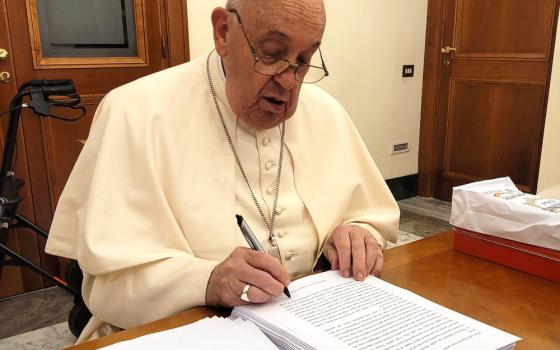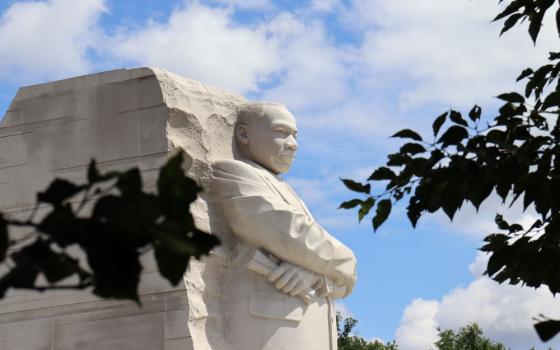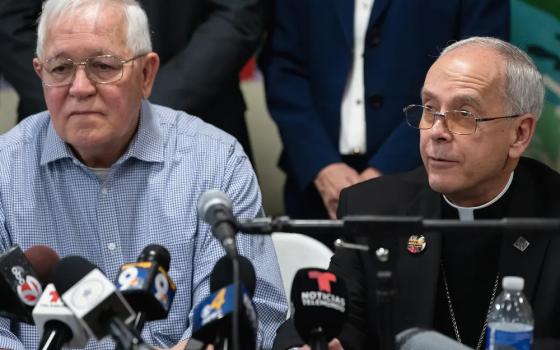
(Unsplash/Dylan)
When one of my favorite aunts was being complimented, she used to say, "Keep talking, I'm listening!" Her line, if not her motivation, helps us enter into today's Scriptures. From Samuel to Jesus and the disciples, it's all about looking, listening and hearing, attitudes that lead to discovering who we are and are called to be. It's all about vocation: seeking and listening.
Today's first reading and the Gospel illustrate two dimensions of our response to God's invitation in our lives. Young Samuel assumed that the only one who would call him was Eli, the priest to whom he was apprenticed. So, when Samuel heard a call, he hastened to Eli's side. Happily, Eli was humble and schooled enough in the ways of God to instruct his apprentice to suspect that his calling was coming not from a teacher, but from God. A trustworthy spiritual director, Eli instructed Samuel to be attentive and to respond in openness to God's will saying: "Speak, Lord, for your servant is listening."
In the biblical sense, listening is the equivalent of obeying. Mary echoed Samuel's response with her unstinting offer: "Behold the handmaid of the Lord, let it be according to your word." Later, Mary's son memorialized a version of his mother's offer as he taught us to say, "Thy will be done." Each of those statements expresses the willingness to do whatever God might ask.
Today's Gospel presents another dimension of the mystery of vocation. Here we encounter disciples of John the Baptist, people involved in a sincere search for God. John, their mentor, as humble as Eli, pointed his own disciples toward the one who gave him his purpose in life. Immediately preceding this Gospel selection, John declared that Jesus, whom he said he did not know, was the one for whom he was preparing the way (John 1:26-35). Believing that, John freed his own disciples to go beyond him.
John and his disciples had the humility to seek more rather than rely on their own ideas or long-established answers. Like so many throughout history, they could appreciate the tradition they had inherited and still believe that more was to come. They were willing to risk the discomfort of exploring beyond the limits of their experience. True children of Abraham, they believed that God's promise offered more than anything they had yet encountered. They harbored the intuition that their moment in history offered them new dimensions of faith — their perspective on everything else.
We might say that some 1,500 years before the birth of Ignatius of Loyola, these disciples exemplified an Ignatian approach to their vocation, seeking to fulfill their deepest desire. Ignatius taught that the deepest desire of the human heart is the desire for God. Jesuit Fr. Mark Thibodeaux describes Ignatius as a "praydreamer," someone who allowed daydreams to lead him toward God's will in his life. Thibodeaux says that Ignatius learned that "God [communicates the divine will] through great desires for faith, hope, and love that welled up inside his heart and soul. By daydreaming in the context of prayer, Ignatius was able to allow those great desires to surface. Doing so … would fire him up to have the necessary passion to perform these great works."
Advertisement
Today's responsorial psalm combines the themes of call and seeking to move us deeper in contemplation and our commitment to our vocation. The psalm refrain, "Here I am, Lord, I come to do your will" echoes the prayer Eli taught Samuel. The chosen verses of the psalm invite us to walk the path of growth in relationship with God. Speaking for so many of us who are seeking something more, the psalmist says, "I have waited for the Lord."
Then, the psalm leads us beyond our own plans, hopes and expectations as it says, "Offering you wished not, but ears to hear your word." That reminds us that no matter how hard we try, no matter our ideas about God's demands, God does not ask us for oblations or penance. In truth, God wants much more than fasting or sacrifice. God's desire is not satisfied until we say, "Behold, I come."
St. Augustine prayed, "Our hearts are restless till they find rest in Thee." That explains that accepting God's invitation and orienting our life around it is the path that will bring us peace and fulfillment beyond what we can imagine. Living our vocation, responding to God's ongoing invitations, leads us to become our deepest, truest selves. God's call may come out of the blue or as a result of sincere seeking — both can happen, and sometimes at the same time.
That tells me we can learn from my Aunt Therese and pray, "Keep talking, I'm listening."







